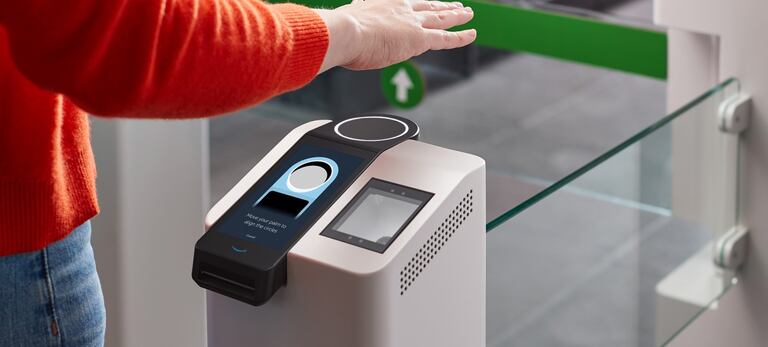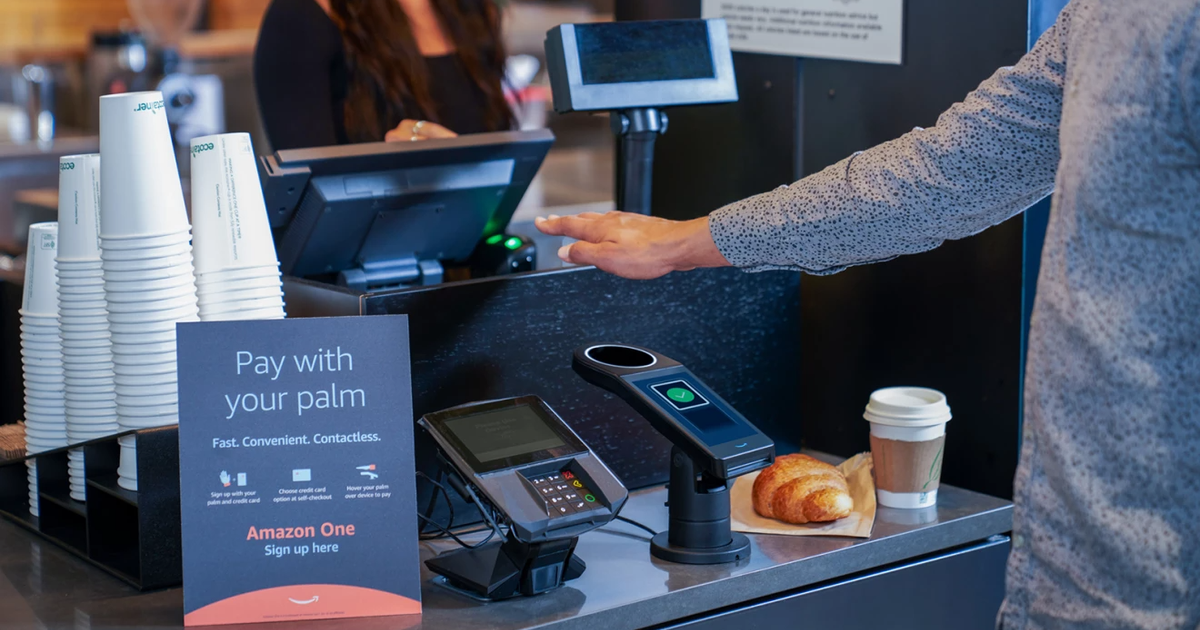Amazon One
Our body is turning into access passwords.
Amazon has joined this trend and announced this Tuesday a new device that allows you to pay or identify with the palm of your hand and without contact.
It is useful in times of pandemic, but raises many questions about the privacy risks.
Why the hand?
Dilip Kumar, Vice President of Technology and Physical Retailing at Amazon, explains that this trait is considered more private than some biometric alternatives because you cannot determine a person's identity just by looking at the image of their hand.
"Ultimately, the use of the palm of the hand as a biometric identifier allows customers to control when and where they use the service," adds the person in charge in the company note.
For now, the devices are at the entrances of two Amazon Go stores in Seattle (United States), and it does not take more than a minute to identify and pass the door, according to the company.
From the industrial giant they are convinced that the idea will be extended to payment methods and offices and to loyalty cards.
Silvana Churruca, the director of the Payment Innovation Hub, an innovation center that precisely develops biometric technologies for payments, argues that the day will come when all accesses will be controlled by these techniques, whether it is to enter the car, at home, in a supermarket, in a bank or anywhere else.
In Europe, yes, things will go slower, as they have much stricter data protection regulation than in the United States or Asia.
"But it is clear that biometrics will play a relevant role in the coming years when we talk about identification, fluid and secure experiences and payment methods," she stresses.
For Churruca, Amazon's announcement is in line with all the changes that occur in the card digitization sector.
“You have to be clear that the plastic card is going to disappear.
It is the future scenario towards which we have been going for years and the covid has only accelerated it, ”she says.
Doubts about this "future scenario"
Data protection continues to raise doubts.
Where does my information go?
Who is in charge of storing the palm of my hand, the iris of my right eye and my face?
Which of all the biometric data is the safest?
Can I erase my biometrics forever whenever I want?
What if they end up in the hands of hackers?
The questions seem endless, and Natalia Martos, CEO and founder of Legal Army, an alternative legal services provider focused on data privacy, doesn't have the answers to all of them.
The expert shows some reluctance when she is told about this new Amazon device and sees this entire system as a very high risk.
“By having this data, which only and exclusively belongs to the user, companies have the access key to all their privacy, 100%.
If there is a security breach or any incident, we expose ourselves to the hands of anyone ”, he warns.
On a plastic card there is a name, a surname and possibly an address, but what does my hand count about me?
"All.
It is something that is only yours and you are only recognized thanks to it ”, Martos answers.
The expert explains that the same happens with facial recognition and that the general data protection regulation says that only biometric data can be used, with the explicit agreement of the user and that there is no less invasive method to achieve this objective.
"Today we can access with keys and passwords and I think that as we work today, facial recognition could be excluded," he says.
The key to using these devices ethically comes down to several things.
One, be very clear about who assumes the risk;
two, who handles the data;
and three, rigorously analyze the impact on privacy.
Asked about data protection, Churruca does not see so many drawbacks, and first insists that it is important for the user to choose who they leave their information to.
In general, people trust institutions that are used to handling sensitive customer data, such as banks or brands like Visa.
Second, the expert explains that each company has its own algorithm.
The signature that Amazon will create will probably have nothing to do with that of another company that decides to use the same device.
“The two host information differently and do not choose the same traits.
The source of the data is the same hand, but the way in which it is processed and encrypted generates a unique code and that strengthens security ”, confides the director of Payment Innovation Hub.
What do users think?
70% of Spanish users have already used biometric technology in some way, according to a survey published by the Payment Innovation Hub itself.
Churruca recognizes that many people feel distrust in the face of digital transformation and do not always understand what happens inside those machines that make life easier or in which hands or box their data ends up.
Despite this, its own survey maintains that six out of 10 Spaniards would use their biometric data as a payment method, and that this percentage increases to eight if they are young and with higher education.
From Churruca's point of view, passwords are methods that are not adapted to human capabilities.
“They do not respect the characteristics of the human being who forgets his passwords or who enters some very easy to remember.
There are much safer methods where there is no deficiency of the human being and they are the ones that will gain more relevance in the future ”, she says.
To generate more trust in society, the solution given by the two experts consulted sounds familiar and seems simple: "People need more information and transparency."
Martos doesn't see that there is enough culture of privacy and that people really understand what it means to put a hand there.
"We need information in that sense and that it is explained in clear and simple language," he adds.
For her part, the director of Payment Innovation Hub, chooses to contextualize.
Human beings are in a process of transformation towards a world that they still do not know or control and that is why it is important that the actors of this change show transparency.
“This dynamic will allow the user to be more aware, analytical and critical of what is happening with their data and to choose what to do.
I am sure, however, that the users we have today will not be the same as we will have in 10 years ”, he concludes.
You can follow EL PAÍS TECNOLOGÍA RETINA on Facebook, Twitter, Instagram or subscribe here to our Newsletter.







/cloudfront-eu-central-1.images.arcpublishing.com/prisa/5BXUKKEUHRB45CXJXXPGMWBHYM.jpg)





